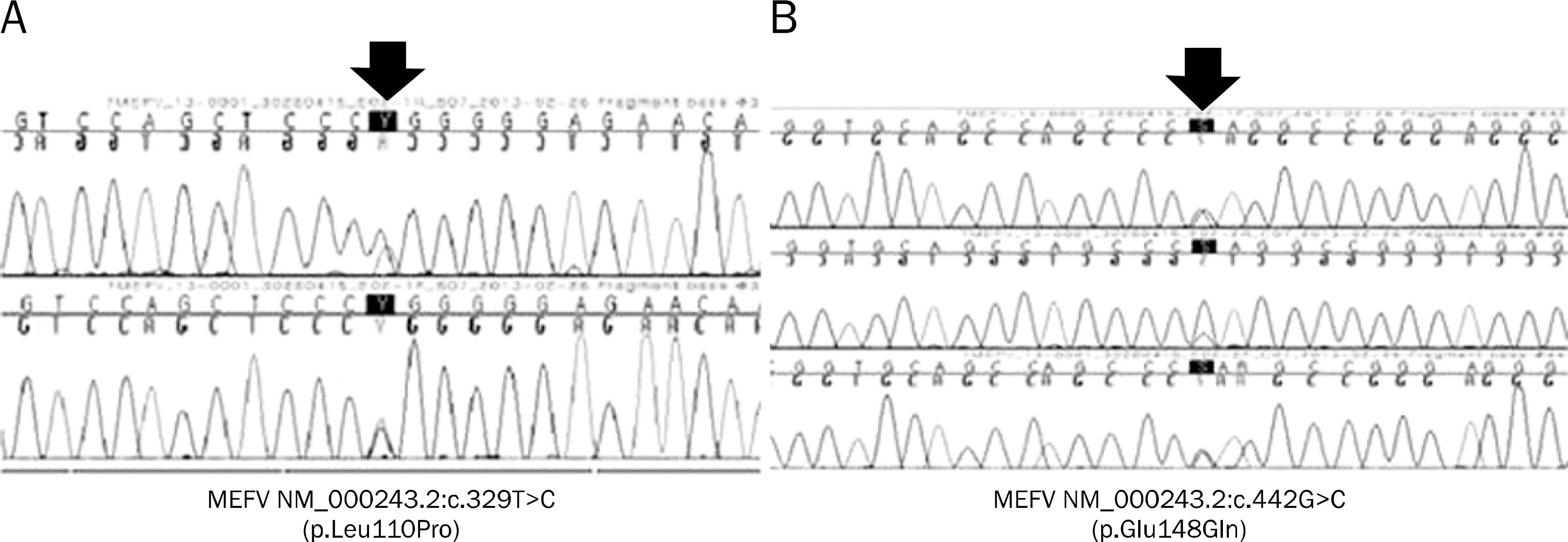Korean J Gastroenterol.
2014 Jul;64(1):40-44. 10.4166/kjg.2014.64.1.40.
A Case of Recurrent Abdominal Pain with Fever and Urticarial Eruption
- Affiliations
-
- 1Department of Internal Medicine, Dongguk University Ilsan Hospital, Goyang, Korea. limyj@dongguk.ac.kr
- 2Department of Laboratory Medicine, Dongguk University Ilsan Hospital, Goyang, Korea.
- 3Department of Dermatology, Dongguk University Ilsan Hospital, Goyang, Korea.
- KMID: 1791893
- DOI: http://doi.org/10.4166/kjg.2014.64.1.40
Abstract
- Familial Mediterranean fever (FMF) is an autosomal recessive disease characterized by recurrent episodes of fever and serosal, synovial, or cutaneous inflammation, caused by a dysfunction of pyrin as a result of mutation within the MEFV gene. It occurs mainly among Mediterranean and Middle Eastern populations, including Jews, Arabs, and Turks. However, FMF cases have been reported outside the Mediterranean and Middle Eastern countries in recent years. Although FMF has been relatively rare in Korea until now, proper recognition of FMF might lead to more frequent diagnoses of FMF. We experienced an interesting case, a 31-year-old Korean man who presented with recurrent abdominal pain with fever and urticarial eruption for 10 years. DNA analysis showed complex mutations (p.Leu110Pro, p.Glu148Gln) in the MEFV gene. To date, three cases have been reported, and this case of FMF with skin conditions is the first case in Korea.
MeSH Terms
Figure
Cited by 1 articles
-
Familial Mediterranean Fever With Complete Symptomatic Remission During Pregnancy
Kwang Taek Kim, Hyun Joo Jang, Jae Eun Lee, Mi Kang Kim, Jun Jae Yoo, Gye Yeon Lee, Sea Hyub Kae, Jin Lee
Intest Res. 2015;13(3):287-290. doi: 10.5217/ir.2015.13.3.287.
Reference
-
References
1. Sayarlioglu M, Cefle A, Inanc M, et al. Characteristics of patients with adult-onset familial Mediterranean fever in Turkey: analysis of 401 cases. Int J Clin Pract. 2005; 59:202–205.
Article2. Migita K, Agematsu K. Clinical aspects of familial Mediterranean fever. Nihon Rinsho Meneki Gakkai Kaishi. 2011; 34:355–360.
Article3. Livneh A, Langevitz P, Zemer D, et al. Criteria for the diagnosis of familial Mediterranean fever. Arthritis Rheum. 1997; 40:1879–1885.
Article4. Mor A, Gal R, Livneh A. Abdominal and digestive system associations of familial Mediterranean fever. Am J Gastroenterol. 2003; 98:2594–2604.
Article5. Barzilai A, Langevitz P, Goldberg I, et al. Erysipelas-like erythema of familial Mediterranean fever: clinicopathologic correlation. J Am Acad Dermatol. 2000; 42:791–795.
Article6. Alonso R, Cisteró-Bahima A, Enrique E, San Miguel-Moncín MM. Recurrent urticaria as a rare manifestation of familial Mediterranean fever. J Investig Allergol Clin Immunol. 2002; 12:60–61.7. Fox M, Morrelli H. Periodic fever with renal amyloidosis. N Engl J Med. 1960; 263:669–672.
Article8. Tsuchiya-Suzuki A, Yazaki M, Nakamura A, et al. Clinical and genetic features of familial Mediterranean fever in Japan. J Rheumatol. 2009; 36:1671–1676.
Article9. Joo K, Park W, Chung MH, et al. Extensive thrombosis in a patient with familial Mediterranean fever, despite hyperimmuno-globulin D state in serum. J Korean Med Sci. 2013; 28:328–330.10. Lim AL, Jang HJ, Han JW, et al. Familial Mediterranean fever: the first adult case in Korea. J Korean Med Sci. 2012; 27:1424–1427.
Article11. Koo KY, Park SJ, Wang JY, et al. The first case of familial Mediterranean fever associated with renal amyloidosis in Korea. Yonsei Med J. 2012; 53:454–458.12. Yamazaki K, Yamazaki T, Masumoto J, Suzuki A, Yazaki M, Agematsu K. Familial Mediterranean fever as representative au-toinflammatory disease. Rinsho Byori. 2009; 57:371–381.13. Erten S, Erzurum C, Altunoglu A. Three family members with familial Mediterranean fever carrying the M694V mutation showed different clinical presentations. Intern Med. 2012; 51:1765–1768.
Article14. Yildirim K, Uzkeser H, Keles M, et al. Relationship between serum interleukin-1beta levels and acute phase response proteins in patients with familial Mediterranean fever. Biochem Med (Zagreb). 2012; 22:109–113.15. Tamir N, Langevitz P, Zemer D, et al. Late-onset familial Mediterranean fever (FMF): a subset with distinct clinical, demographic, and molecular genetic characteristics. Am J Med Genet. 1999; 87:30–35.
Article16. Padeh S. Periodic fever syndromes. Pediatr Clin North Am. 2005; 52:577–609.
Article17. Lee SM, Kim IK, Kim DH, et al. A case of eosinophilic colitis. Korean J Gastroenterol. 1997; 29:394–398.18. Konca K, Erken E, Ydrýsoglu S. Increased serum eosinophil cati-onic protein levels in familial Mediterranean fever. J Rheumatol. 1998; 25:1865–1867.19. Kocak G, Kocak E, Yilmaz SR, et al. MEFV gene mutations in a patient with eosinophilic gastroenteritis. South Med J. 2010; 103:1170–1172.
Article20. Tomiyama N, Higashiuesato Y, Oda T, et al. MEFV mutation analysis of familial Mediterranean fever in Japan. Clin Exp Rheumatol. 2008; 26:13–17.
- Full Text Links
- Actions
-
Cited
- CITED
-
- Close
- Share
- Similar articles
-
- Two Cases of Pruritic Urticarial Papules and Plaques of Pregnancy in the Postpartum
- Adult-Onset Still’s Disease with Atypical Persistent Rash and Histologic Findings of Neutrophilic Urticarial Dermatosis
- A Case of Abdominal Epilepsy Presenting withRecurrent Abdominal Pain
- Omalizumab as a Succesfull Therapy in Normocomplementemic Urticarial Vasculitis: A Series of Four Patients and Review of the Literature
- A Case of Korean Hemorrhagic Fever Complicated with Pregnancy



